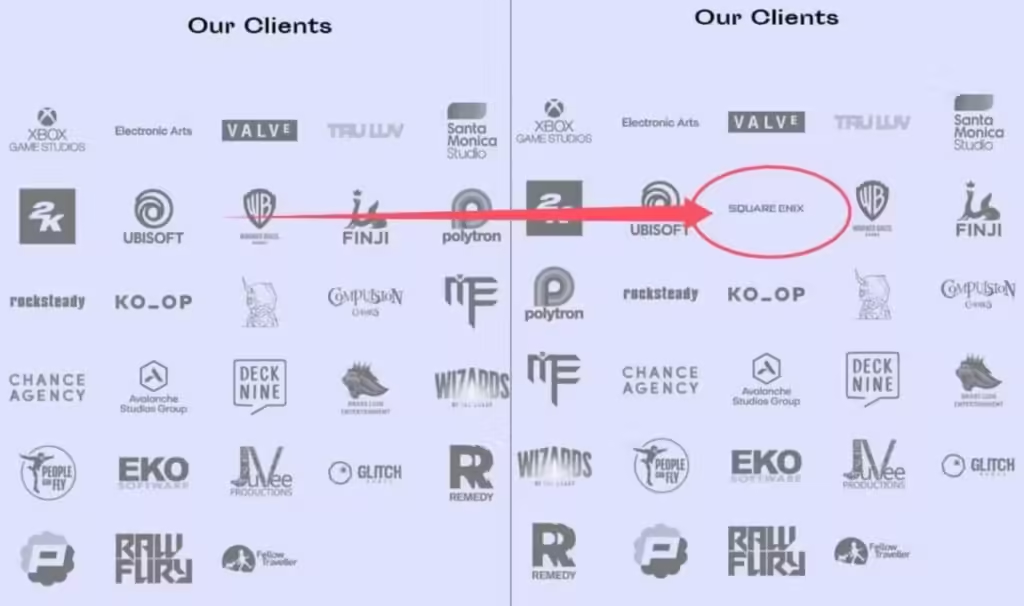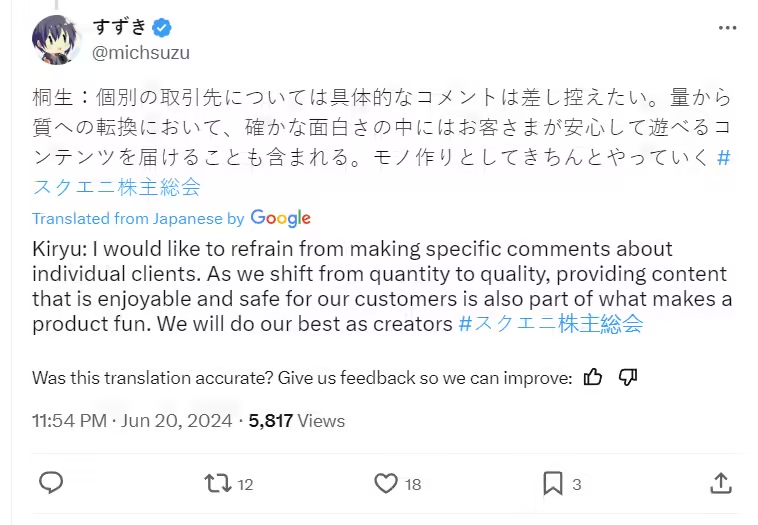The world of video game development is constantly evolving, with companies working tirelessly to deliver memorable gaming experiences. Yet, recent events have raised questions about the influence of ideology on game production. Sweet Baby Inc., a Canadian video game consultancy firm known for its promotion of woke ideology, has made headlines by removing Square Enix from its client list. This change raises speculation regarding the reasons behind the decision and the potential impact on the future of video games.
Sweet Baby Inc.’s Mysterious Client List Update
Previously, Square Enix was prominently featured as a client of Sweet Baby Inc., listed between other prominent names such as Ubisoft and Warner Bros. Games. However, recent updates to Sweet Baby Inc.’s website show that Square Enix is no longer listed, along with another notable removal—Nerial, a subsidiary of Devolver Digital, known for titles like Reigns and Card Shark.
The reasons behind these removals remain unclear, sparking widespread speculation within the gaming community. One potential explanation might stem from an investor’s inquiry during a recent Square Enix earnings report. The investor openly questioned the nature of Square Enix’s relationship with Sweet Baby Inc., voicing concerns over whether the company’s involvement with the consultancy was in the best interests of the developer’s shift toward higher-quality games.
Square Enix’s Response and Shift from Quantity to Quality
During the earnings report, Square Enix President Takashi Kiryu was asked directly about the company’s ties with Sweet Baby Inc. Kiryu declined to comment specifically on individual clients but reiterated Square Enix’s commitment to focusing on quality over quantity. This shift in corporate strategy, aimed at creating more enjoyable and safe content for customers, indicates a possible reevaluation of their partnerships, especially those linked to external consultancies that push specific ideological perspectives.

The decision to emphasize quality aligns with Square Enix’s desire to reconnect with its core audience, moving away from projects that may have strayed from the company’s roots. Kiryu’s careful language suggests a broader internal strategy—one that puts player experience and engagement at the forefront, rather than catering to niche political or ideological trends that may alienate a broader audience.

Sweet Baby Inc.’s Influence in the Gaming Industry
Founded with a mission to promote diverse and inclusive storytelling in video games, Sweet Baby Inc. has garnered both praise and criticism for its work. The company’s efforts to influence how narratives are constructed in gaming often revolve around implementing woke ideology, aiming to ensure greater representation of marginalized voices. While inclusivity is often considered a positive force, many critics argue that the approach taken by firms like Sweet Baby Inc. risks prioritizing ideology over gameplay quality and artistic integrity.
Sweet Baby Inc.’s work with a variety of gaming companies, including Ubisoft and Warner Bros. Games, speaks to their ability to consult on storytelling and design elements. However, their removal of Square Enix and Nerial from their client list has sparked theories about a potential ideological divergence between these companies and the consultancy.
The Forspoken Debacle: A Case Study in Ideological Influence
Square Enix’s past engagement with external consultants who champion progressive ideologies has had mixed results. One high-profile example is Forspoken, a game developed by Square Enix and its now-defunct studio, Luminous Productions. In the development of Forspoken, Square Enix collaborated with consultancy group Black Girl Gamers, which, much like Sweet Baby Inc., focuses on bringing diverse voices into the gaming space.
While Forspoken initially drew attention for its ambitious scope and diverse characters, its eventual release was met with disappointing sales and mixed critical reception. Yosuke Matsuda, former Square Enix Representative Director, acknowledged the game’s poor performance during the company’s financial results briefing in early 2023. While praising aspects of the game, including its parkour and combat mechanics, Matsuda conceded that the overall reception was challenging, and the lackluster sales placed significant downside risk on Square Enix’s fiscal earnings.
In the aftermath, Luminous Productions was shut down, with its team absorbed back into Square Enix’s main operations. The failure of Forspoken stands as a cautionary tale, underscoring the potential risks of prioritizing ideological concerns over gameplay fundamentals and consumer engagement.
A New Corporate Philosophy for Square Enix
With Forspoken’s failure serving as a backdrop, Square Enix has since adopted a new corporate philosophy centered on creating “unforgettable experiences” and “delivering ensured fun.” The company has made a strategic commitment to focus on quality, echoing its desire to move away from simply churning out a high volume of games. This corporate shift could be seen as a rejection of outside influence from consultancies like Sweet Baby Inc., whose ideological goals may no longer align with Square Enix’s renewed focus on player-centric content.
The company’s decision to distance itself from woke consultants may signal a broader industry trend, with other developers potentially following suit. With gaming giants like Square Enix reconsidering their external partnerships, there could be a wider reassessment of how ideologies intersect with game design, storytelling, and player satisfaction.
Dragon Quest III HD-2D Remake and Transgender Ideology
Interestingly, despite Square Enix’s shift away from consultancies like Sweet Baby Inc., the company has still faced criticism for embracing aspects of woke ideology in its internal game development. One notable example is the upcoming Dragon Quest III HD-2D Remake, in which the company has decided to remove male and female identifiers, opting instead for Body Type A and Body Type B.
This decision aligns with trends in the gaming industry toward gender inclusivity but has also provoked backlash. Critics argue that removing traditional gender identifiers contributes to a “transgender ideology” that distorts biological realities. These critics point to the potential societal consequences of normalizing such ideologies in mass media, particularly in video games, a medium with wide-reaching influence over young audiences.

